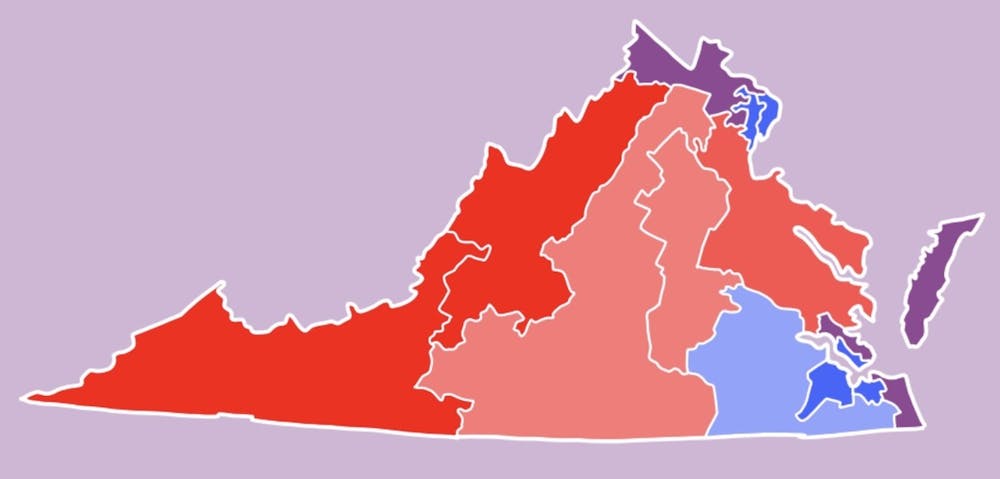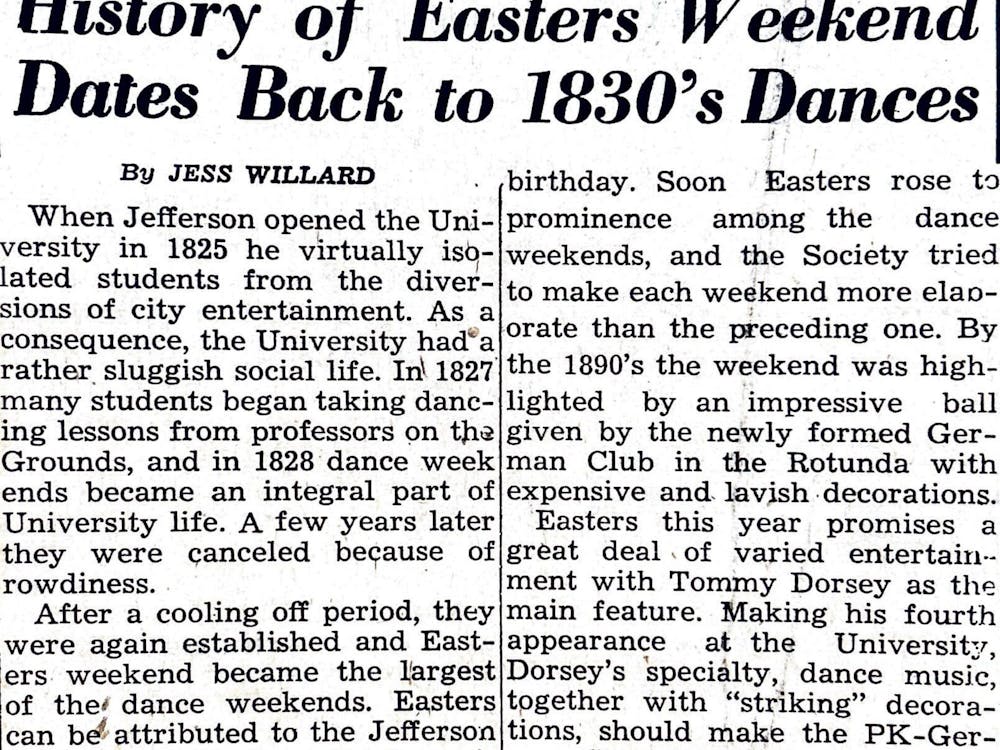Besides voting for president, a senator and a new member of the House of Representatives this November, Virginians will need to decide whether they want to support Amendment One — an amendment which purports to limit partisan gerrymandering.
Amendment One establishes a sixteen-person panel, made up of eight legislators and eight non-legislators, that would draw electoral maps. The Democratic leader of the House, the Democratic leader of the Senate, the Republican leader of the House and the Republican leader of the Senate all get to choose four of these members.
If two legislators disapprove of the maps, then a final decision on how the maps are drawn goes to the Virginia Supreme Court, which has a six-to-one Republican-Democrat split.
Mark Levine, a Democratic delegate from Virginia’s 45th District, is campaigning against Amendment One. Levine believes that the Amendment is a last ditch effort by Republicans to maintain control over redistricting in Virginia.
Levine is particularly critical of the role that the Virginia Supreme Court plays in redistricting. Levine noted that if just two Republican legislators disapproved of the maps, the maps would then be made by a Republican Virginia Supreme Court.
In Virginia, judges on the Supreme Court are chosen by the legislature.
“The judges who draw the lines could actually draw a legislature gerrymandered in favor of Republicans, and then they can be assured of their reappointment because you have the judges design the legislature that chooses the judges that design the legislature,” Levine said in an interview with The Cavalier Daily.
During the 2020 legislative session, the Amendment passed the Virginia State Senate with bipartisan support, with just two Democratic state senators voting no. In the Virginia House of Delegates, the Amendment passed with bipartisan support, though with significant Democratic opposition. Nine Democratic delegates and 45 Republican delegates voted yes on the amendment, while 46 Democratic delegates voted no.
“It didn't go through committee, it didn't go to either floor — it's all done in a conference committee at the last minute, on the last day, where the Republicans saw their grasp of power starting to erode,” Levine said.
One of Levine’s main criticisms is the design of the panel. The panel is not independent, rather, eight members are appointed by party leaders, with eight legislators sitting on the panel.
“It would be well written if it had an independent citizens commission,” Levine said. “It'd be well written if it actually banned gerrymandering. It's designed to let legislators choose their voters rather than when voters choose their legislators.”
Daela Taeoalii-Tipton, the Deputy Director of FairMapsVA, an advocacy group dedicated to supporting Amendment One, believes that the Amendment will end partisan gerrymandering in Virginia.
“While I appreciate how some opponents of the amendment want even more reform, it's taken all of Virginia's history to get to where we are today,” Taeolalii-Tipton said. “I believe we must vote yes for the reform we have in hand for this decade's redistricting process, as we continue to work for more reform in the future.”
If Amendment One is passed, it will become a part of the Virginia Constitution. Levine expressed concerns about the difficulty of legislation once it becomes enshrined in the Virginia Constitution.
“We still have a ban on same sex marriage in our Virginia Constitution, because it takes several years to remove it,” Levine said. “So don't put something flawed in the Constitution.”
In Bostic v. Rainey, the Fourth Circuit Court of Appeals struck down Virginia’s ban on same sex marriages. However, the language banning the practice still remains in the Virginia Constitution, it is simply not enforced.
The Virginia chapter of the National Association for the Advancement of Colored People has come out in opposition to Amendment One. In a press release the Virginia NAACP wrote that “any redistricting amendment must include explicit and strong protections for Black voters and voters of color” — a quality that the organization said Amendment One lacks.
University Democrats isn’t planning on taking a firm stance on Amendment One given that Democrats have contrasting views on the merits of the bill.
“While Amendment One is important, we're focusing our efforts on electing [Democratic Fifth District candidate] Dr. Cameron Webb to Congress and flipping the Fifth Congressional District,” UDems communications chair and second-year College student Jackson Postal said.
College Republicans, however, have voiced their strong support for the amendment, noting the generations-long impact its adoption could have on Virginia politics.
College Republicans President and fourth-year College student Chris Tomlin said the Commonwealth’s historically gerrymandered districts have created an unfair system to which Amendment One offers a solution.
“I mean you have districts — there's one particularly around Richmond — where it just looks like an upside down U shape and it's just politicians choosing their own voters just to win districts,” Tomlin said. “I'm very confident that with this bipartisan committee made up of U.S. citizens and legislators we can probably fix this problem.”
Delegate Roxann Robinson, a Republican representing Virginia’s 27th District, is in favor of the amendment and hopes to see it pass on Election Day. Robinson emphasized the clarity that the amendment will bring to what has been a complicated history of redistricting in Virginia.
Throughout the past decade there have been several lawsuits filed in opposition to the lines previously drawn by Republicans following the 2010 census, including one that made it to the Supreme Court in 2019. The Court’s ruling resulted in the adoption of new legislative districts drawn by a panel of judges.
“As a constitutional amendment there was bipartisan support” Robinson said. “It isn’t the perfect plan, but of all the things that had been discussed, I think it's probably the most fair look at how we can approach drawing new lines, drawing new districts and having it, you know, be acceptable”
While those in favor of Amendment One see it as having a positive impact on voters who want fair representation in Virginia, there is some concern that the additional redistricting could result in confusion among the electorate.
“Until they get the lines drawn, no one will really know what district they belong to,” Robinson said. “They won't know if their legislator that has been representing them will still be representing them or if it'll be somebody new, but that's gonna happen under redistricting.”
If voters decide against Amendment One, it opens up the possibility that the state could see more partisan gerrymandering. With Democrats currently in control of the state legislature, it would be up to them to draw new lines — something Robsinson sees as a “huge problem” for the future.
Taeoalii-Tipton noted that redistricting reform is typically opposed by the party in power.
“Just this year, reformers in red, blue and purple states — Oregon, Arkansas, North Dakota, Missouri, Nevada and Oklahoma — all came up against the majority and sadly, we're the only reform left standing,” Taealii-Tipon said.
That said, Levine says he wants redistricting reform — just not in the form of Amendment One.
“We have to put in a new bill in [20]21 to have a purely independent citizens commission,” Levine said. “I think we will get it done if the Amendment fails because I think Republicans will join us, because they would also prefer an independent citizens commission over a Democratically chosen commission.”
Levine would then seek to propose an Amendment in 2022 to enshrine rules against gerrymandering and the establishment of an independent in the Virginia Constitution.
If Amendment One passes, Levine says that all he’ll be able to do is hope for the best.
“If [Amendment One] passes, we're up the creek without a paddle, and we just have to rely on the good faith of others,” Levine said.







